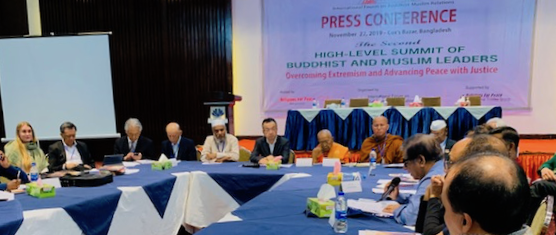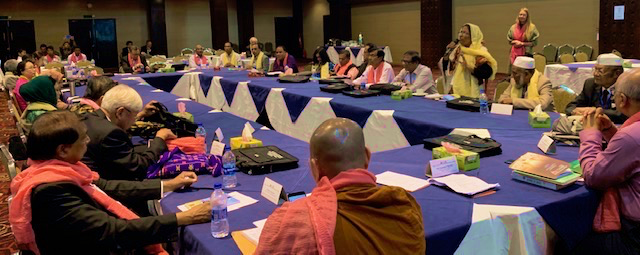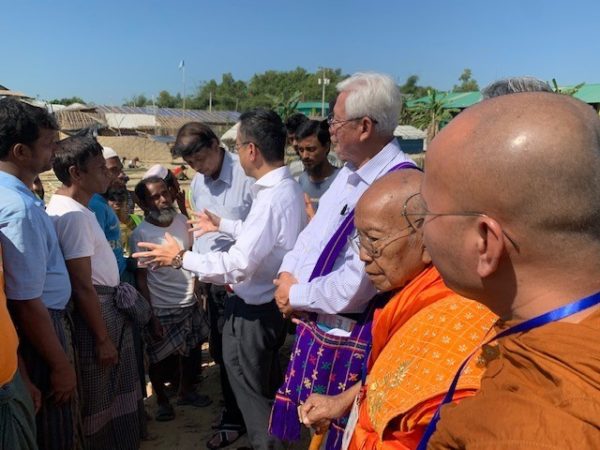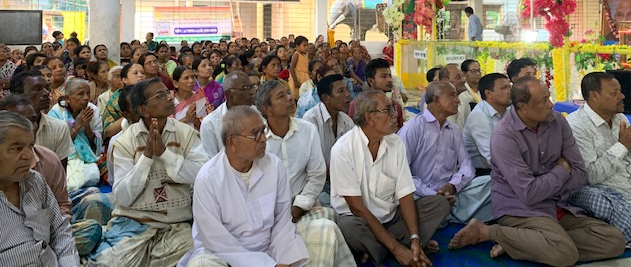Buddhist and Muslim Leaders Summit in Solidarity with Rohingya Refugees Reaffirms Yogyakarta Statement of Shared Values
November 21, 2019(Cox’s Bazar, Bangladesh) Buddhist and Muslim leaders from South and Southeast Asia convened the 2nd Buddhist-Muslim Summit in Cox’s Bazar to express solidarity with Rohingya refugees and commit to further strengthening common action in response to the humanitarian crisis.
This high-level summit convened approximately 30 Buddhist and Muslim leaders across South and Southeast Asia to discern current needs and efforts across the regions particularly related to overcoming extremism and challenges to inclusive societies. Religious leaders, including women leaders, as strategically positioned to address these urgent concerns, as they continue to play an important socio-cultural role in shaping societal values across Asia. The dedicated work of these leaders increases understanding of difference within their communities and breaks down stereotypes, prejudice, discrimination and hatred that exists across perceived divides.
Participants endorsed the Yogyakarta Statement on Shared Values and Commitments [1] and committed themselves to implementing its shared action plan across the region. These leaders concluded that the values embedded in the Yogyakarta Statement must be applied by religious actors to promote mutual understanding and tolerance amongst Buddhist and Muslim communities.
As a key outcome, a task force to advance one of the seven shared values embodied in the Yogyakarta Statement on “Living in Harmony with the Environment” was formed, with a focus on Bangladesh.
Religions for Peace (RfP), as a core group member of the International Forum on Buddhist Muslim Relations (BMF), supported the organization of the summit, in partnership with the International Network of Engaged Buddhists (INEB), International Movement for a Just World (JUST), Persyarikatan Muhammadiyah (PM) and The Network for Religious and Traditional Peacemakers.
The BMF intends to:
- – serve as a platform for intra-religious and inter-religious initiatives in education & advocacy
- – enable rapid reaction/ solidarity visits/ early warning/ conflict prevention in the event of conflict
- – develop and provide tools and materials for constructiveengagement and strategic common action
- – develop the effective use of media for positive messaging, particularly via social & alternative media.
South and Southeast Asia is one of the most religiously diverse regions in the world. While providing a compelling setting for the advancement of interfaith work and peace building in diverse societies, rising nationalistic narratives and tension are of concern in the region, particularly among Muslims and Buddhists.
While celebrating the region’s vast diversity, it is vital to understand how such demographics, coupled with socio-political dynamics, can pressure minority groups to conform to the cultural and social norms of the majority religion. This calls for a discussion about inclusive citizenship and strategies to advance peace and justice across South and Southeast Asia.
We invite you to view additional media coverage.




